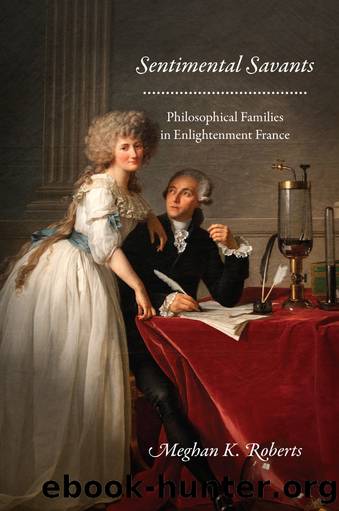Sentimental Savants by Meghan K. Roberts

Author:Meghan K. Roberts [Roberts, Meghan K.]
Language: eng
Format: epub
ISBN: 9780226384252
Publisher: The University of Chicago Press
Published: 2016-10-06T00:00:00+00:00
Case Studies
Ãmilie Du Châtelet
Ãmilie Du Châtelet was once a shadowy figure, famed only for her romantic relationship with Voltaire, but historians have worked to restore her reputation as a philosophe. She produced an array of publications, including her celebrated translation of Isaac Newtonâs Principia Mathematica. Du Châtelet also invested considerable energy in raising her two children. She used her maternity to craft an image of herself as a virtuous savant, as opposed to an overly ambitious, unfeminine wannabe.
Her daughter, Gabrielle-Pauline, was born in 1726 and her son, Florent-Louis, followed in 1727. Du Châtelet especially focused on preparing her son for greatness. She never doubted that he offered his tutors âa pretty soul to develop.â30 In contemplating her sonâs upbringing, Du Châtelet drew considerable inspiration from her own interests. She encouraged her son to delve into natural philosophy, a subject freighted with moral and intellectual value. Although studies of nature had once paled in comparison with studies of religion, by the 1730s, natural philosophy had gained prestige, and Du Châtelet wanted her son to be up to date on the latest findings.31 Studying nature would sharpen his intellect and reveal to him the impressive order of the cosmos.
Du Châteletâs education of her son took place against the backdrop of a larger debate of how nobles could best develop patriotism and merit. These questions interested Du Châtelet, and she thought carefully about how to raise her son. She wanted to form him into a leader who would serve his nation. She ultimately decided that the traditional path remained the best: the young monsieur should train to be a military officer. Less conventionally, Du Châtelet decided that he should be an especially learned sort of officer, one whose usefulness would in part be determined by his keen understanding of philosophy.
She even wrote a text to introduce her son to natural philosophy: the Institutions de Physique (Foundations of Physics, 1740), an overview of recent research in which she attempted to marry Leibnizian and Newtonian physics.32 All parents should encourage such study, she opined. âI have always thought that manâs most sacred duty is to give their children an education that would not cause them to regret their youth,â she asserted. â[It is] perhaps the only time of your life that you can devote to the study of nature,â which is âthe key to all discoveries.â It was at this age, the âdawn of his reason,â that his mind was sufficiently âflexibleâ to take on the âpunishingâ study of nature. Indeed, Du Châtelet glorified the pursuit of natural philosophy to such an extent that she insisted that âthe research of truth is the only thing over which the love of your country should not prevail.â33 She depicted natural philosophy as fundamental to her sonâs education, with the implication that other parents should do the same. Florent-Louisâs education was rooted in nature, like many other Enlightenment educations, but with greater rigor than was the norm.
Du Châtelet plainly wanted her son to appear âenlightened,â in the sense that he would display a certain amount of erudition.
Download
This site does not store any files on its server. We only index and link to content provided by other sites. Please contact the content providers to delete copyright contents if any and email us, we'll remove relevant links or contents immediately.
Hit Refresh by Satya Nadella(9134)
When Breath Becomes Air by Paul Kalanithi(8447)
The Girl Without a Voice by Casey Watson(7889)
A Court of Wings and Ruin by Sarah J. Maas(7847)
Do No Harm Stories of Life, Death and Brain Surgery by Henry Marsh(6941)
Shoe Dog by Phil Knight(5269)
The Rules Do Not Apply by Ariel Levy(4969)
A Higher Loyalty: Truth, Lies, and Leadership by James Comey(4964)
Hunger by Roxane Gay(4928)
Tuesdays with Morrie by Mitch Albom(4784)
Everything Happens for a Reason by Kate Bowler(4743)
The Immortal Life of Henrietta Lacks by Rebecca Skloot(4588)
Millionaire: The Philanderer, Gambler, and Duelist Who Invented Modern Finance by Janet Gleeson(4478)
How to Change Your Mind by Michael Pollan(4357)
All Creatures Great and Small by James Herriot(4322)
The Money Culture by Michael Lewis(4207)
Man and His Symbols by Carl Gustav Jung(4137)
Elon Musk by Ashlee Vance(4127)
Tokyo Vice: An American Reporter on the Police Beat in Japan by Jake Adelstein(3996)
